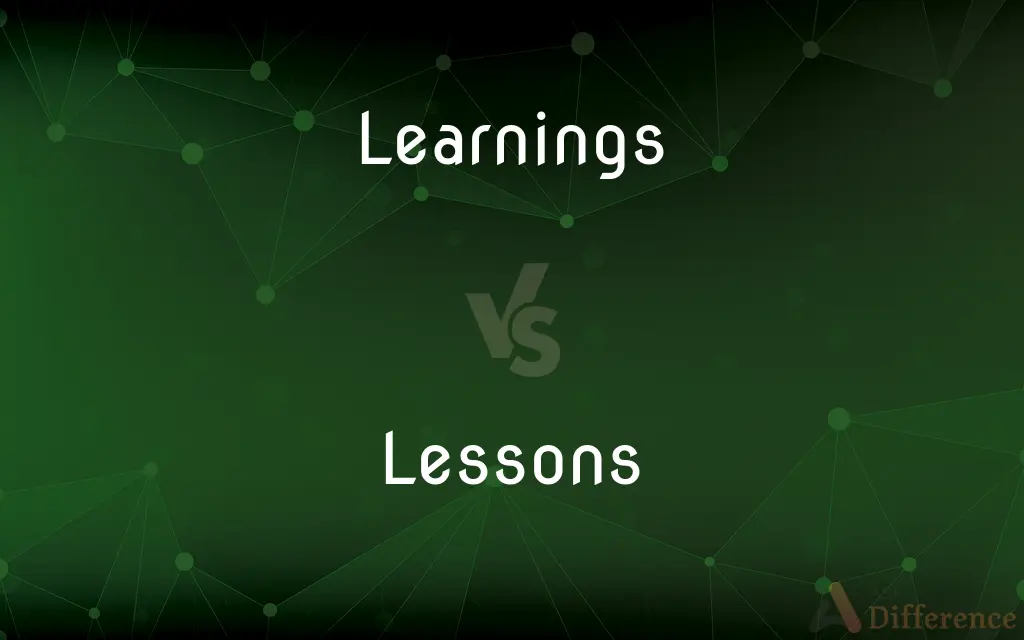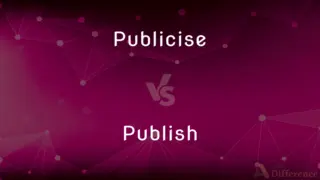Learnings vs. Lessons — What's the Difference?
By Fiza Rafique & Urooj Arif — Updated on April 27, 2024
"Learnings" refers to the insights or knowledge gained from experiences, while "lessons" denote structured educational experiences or moral teachings.

Difference Between Learnings and Lessons
Table of Contents
ADVERTISEMENT
Key Differences
Learnings are often the outcomes of personal or organizational experiences, focusing on the accumulation of knowledge over time. In contrast, lessons are structured instructional sessions or moral teachings intended to impart specific knowledge or values.
Learnings are typically informal and derived from observations or trial and error, emphasizing practical application and personal growth. Whereas lessons are more formal and are usually delivered in educational settings like classrooms or training seminars.
While learnings can be subjective and vary widely between individuals, lessons are often predetermined and designed to achieve uniform understanding among learners.
Learnings are adaptable, often evolving with new experiences and insights, reflecting a continuous process. On the other hand, lessons may remain static, focusing on a set curriculum or specific teaching points.
In terms of application, learnings can influence decision-making and behavior in real-time and are often integrated into one’s approach to similar future situations. Lessons, however, tend to provide a foundation or framework for thinking and are usually recalled explicitly when needed.
ADVERTISEMENT
Comparison Chart
Definition
Insights gained from experiences
Structured educational experiences
Nature
Informal, experiential
Formal, instructional
Source
Personal or organizational events
Educational settings, mentors
Outcome
Practical application, growth
Knowledge imparting, moral teaching
Flexibility
Adaptable, evolving
Often static, predefined
Compare with Definitions
Learnings
Knowledge or insight gained from experience.
His learnings from the project were invaluable for his career progression.
Lessons
Structured teaching sessions in an academic setting.
His math lessons included both lectures and hands-on activities.
Learnings
Informal accumulation of understanding over time.
Her learnings from years in the industry make her an expert consultant.
Lessons
Educational experiences designed to impart knowledge.
She took private piano lessons to improve her skills.
Learnings
Outcomes derived from personal or professional situations.
The team’s learnings from the failed launch helped them succeed the second time.
Lessons
Sessions designed to teach a particular subject or concept.
The driving lessons taught her not only how to operate a car but also road safety.
Learnings
A personal or collective reflection of experiences.
The conference provided learnings that he applied in his own business strategies.
Lessons
Instructional content intended to teach a specific skill or topic.
The science lessons covered a range of topics from biology to physics.
Learnings
Insights gained that influence future decisions.
Their learnings from customer feedback led to significant product improvements.
Lessons
Something to be learned
Lessons from observing nature.
Learnings
(proscribed) learning
Lessons
A period of instruction; a class.
Lessons
An assignment or exercise in which something is to be learned.
Lessons
The act or an instance of instructing; teaching.
Lessons
An experience, example, or observation that imparts new knowledge or understanding
The conversation was a lesson in tact.
Lessons
The knowledge or wisdom so acquired. Missing the opening act taught me a lesson about being late.
Lessons
Often Lesson A reading from the Bible or other sacred text as part of a religious service.
Lessons
To teach a lesson to; instruct.
Lessons
To rebuke or reprimand.
Lessons
Plural of lesson
Lessons
Moral or ethical teachings from various sources.
One of the key lessons from the story is the importance of honesty.
Common Curiosities
What is the main difference between learnings and lessons?
Learnings are insights gained from experiences, often informal, while lessons are structured educational or moral teachings.
Which is more valuable in the workplace, learnings or lessons?
Both are valuable; lessons provide the foundation and learnings enhance adaptability and problem-solving skills.
What role do learnings play in personal growth?
Learnings from personal experiences contribute significantly to self-awareness, resilience, and life skills development.
How do lessons impact professional development?
Lessons, especially in professional settings, equip individuals with specific skills and knowledge essential for career advancement.
Can learnings be shared like lessons?
Yes, learnings can be shared, especially in collaborative environments like workplaces or learning communities, though they may be more subjective.
Are learnings applicable outside of the context in which they were gained?
Often, yes; learnings can provide general insights that are adaptable to various situations beyond their original context.
Can lessons lead to learnings?
Yes, structured lessons can provide the basis for personal learnings as individuals apply taught concepts to real-life situations.
Are learnings always intentional?
Not necessarily, learnings can occur naturally through experiences without deliberate intent.
How do educators ensure that lessons turn into learnings?
Educators use engaging and relevant content, practical applications, and reflection to help students internalize lessons as personal learnings.
Can learnings and lessons be collective?
Yes, learnings and lessons can be collective when shared among groups or communities, contributing to collective knowledge and wisdom.
Share Your Discovery

Previous Comparison
Publicise vs. Publish
Next Comparison
Treggings vs. JeggingsAuthor Spotlight
Written by
Fiza RafiqueFiza Rafique is a skilled content writer at AskDifference.com, where she meticulously refines and enhances written pieces. Drawing from her vast editorial expertise, Fiza ensures clarity, accuracy, and precision in every article. Passionate about language, she continually seeks to elevate the quality of content for readers worldwide.
Co-written by
Urooj ArifUrooj is a skilled content writer at Ask Difference, known for her exceptional ability to simplify complex topics into engaging and informative content. With a passion for research and a flair for clear, concise writing, she consistently delivers articles that resonate with our diverse audience.
















































